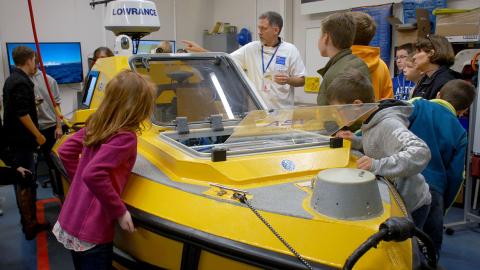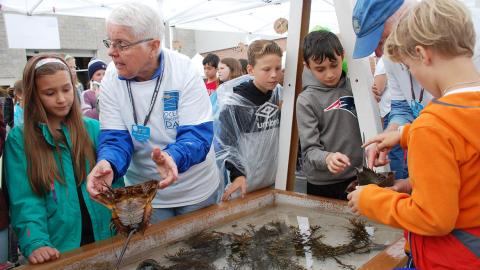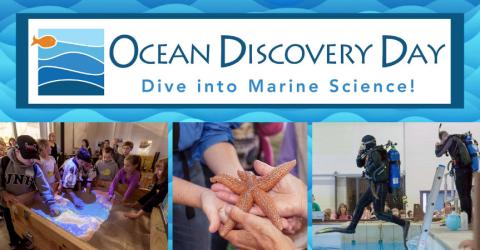

We had an amazing Ocean Discovery Day 2025 and want to send out a heartfelt THANK YOU to everyone who participated – either as guests, volunteers, past and present students, staff, campus and external partners... the list goes on. It truly takes a village, and we are grateful to each and every one of you!
We can't wait to see you all again for Ocean Discovery Day 2026, coming next fall! Sign up here to get the latest email updates.
All are welcome to Ocean Discovery Day where you'll discover Marine Science and Ocean Engineering at UNH! From ocean acoustics to plankton, there's something for everyone! Designed to engage explorers of all ages, Ocean Discovery Day offers a variety of hands-on activities and presentations.
Get a glimpse at the latest technology used to map the ocean floor, see how scientists use data sondes to monitor the water quality in the Great Bay Estuary and how acoustic technology is used to study marine life. Participants can operate a Remotely Operated Vehicle (ROV), touch a sea star, try your hand at knot tying or painting with fish, and so much more. This family-friendly event is FREE!
Where
Jere A. Chase Ocean Engineering Laboratory
UNH Campus
24 Colovos Road
Durham, NH 03824
Parking
Parking for each event varies. Please see individual program page for parking information.
For directions to the UNH Durham campus as well as parking and campus maps, visit the UNH Transportation Center website.
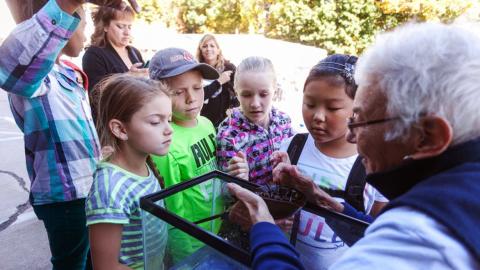
Here is a sampling of our 2025 activities!
- 3-D Topography Sandbox - Possibly the coolest sandbox ever! You can "move mountains" with our 3D topography sandbox. Every hill, valley, or mountain you create in the sand will automatically change color to match its new "elevation" – and it's all projected on the screen!
- Aquaculture – Integrated multi-trophic aquaculture (IMTA) is a self-contained aquaculture system that allows multiple species to grow at the same time within a single floating structure. “Multi-trophic” refers to levels of a food web. Each of the different species in the IMTA system provides a benefit to the others: Steelhead trout, blue mussels, kelp and dulse. Find out why aquaculture is important to the local economy
- Autonomous Surface Vehicles – These unmanned surface vehicles play a vital role in collecting data for our researchers.
- Changing Arctic – The Arctic is warming three times faster than the rest of the globe. Come join the Convergent Arctic Research Perspectives and Education (CARPE) students and faculty to learn about glaciers, permafrost, and how the warming Arctic is affecting animals and people.
- Coastal Ecosystems – Learn about some amazing creatures and coral that we find in the oceans.
- Colors of the Ocean – An inactive activity on ocean colors including painting ocean maps with watercolors.
- Estuaries – Estuaries occur where "rivers meet the sea." They provide critical wildlife habitat, nurseries for many marine species, buffering from coastal flooding, recreational enjoyment, and safe harbor for marine commerce and the maritime industry. New Hampshire is home to two major estuaries: the Great Bay Estuary and the Hampton-Seabrook Estuary.
- Fish Printing – Creating art with fish!
- Immersive Deep Sea Room – How do we explore the ocean? Lean all about the technologies that our researchers use to explore the deep.
- Knot Tying - Proper knot tying it critical for research vessel safety. You will have the opportunity to try your hand at knot tying.
- Lobsters! – Have you ever measured a lobster? How about banding a lobster? Give both a try at this exhibit!
- MANTA RAY: Marine Research Vehicle - The Marine And Naval Technological Advancements for Robotic Autonomy (MANTA RAY) group is a multi-vessel project bringing together multiple departments in STEM at UNH. The MANTA RAY robotic will be demonstrated in the Engineering Tank.
- Marine Mammals Program – Ever wonder how a whale stays warm in the fridge ocean waters or how long is a humpback whale? Visit the Marine Mammals table to find the answers to both questions and more!
- Ocean Acoustics – Participants will have an opportunity to hear the different sounds of animals as they interact in their underwater environment.
- Ocean Visualization – Researchers collect and data this data is transferred into advanced visualization tools through the “VisLab”.
- Oyster Biosensor & Invertebrates – Ocean changes influences the behavior and health of coastal marine invertebrates. Researchers will show you how they are using biosensors to monitor filtering behavior in shellfish
- Plankton & Microbes – Exploring life in a drop of water
- Rocky Shore/Marine Touch Tank – What creatures might you find in the inter tidal zones? Have an opportunity to see and touch those creatures.
- Scale Floating Wind Turbine Demonstrations – Head on over to our tow/wave tank to see a turbine in action!
- Seacoast Science Center – The Seacoast Science Center will be highlighting the importance of the intertidal zone, and an invasive species to be on the look out for! Join us to help gather citizen science data on invasive european green crabs. Students and participants will get an up close look at green crabs, and interact with fun intertidal zone activities.
- Seagrass: The Ecosystem Engineer! – Explore the ways that engineers and ecologist at UNH study how seagrass interacts with its aquatic environment through live demonstrations, and craft your own eelgrass plant!
- SEA-ing Sounds – A sound-based scavenger hunt!
- Shake It Up: Science Fun with Beach Sand – This exhibit will demonstrate how beach sand plays a role in shaping beaches and coastal areas. Different sand grain sizes can be observed. The impact of different sand grain sizes on the shape or slope of a beach will be investigated. The process of momentary sand liquefaction (similar to quicksand!) will be demonstrated in real time and audience members have a chance to create their own momentary sand liquefaction event. Sand liquefaction will be discussed in relation to coastal structures and communities.
- Shellfish Behavior and Health Monitoring – Learn how ocean changes influences the behavior and health of coastal marine invertebrates.
- Squid Dissection – Dissect a squid! This is a popular activity that takes approximately 30 minutes. Participants can expect to wait in line for the activity. Place holding is not allowed.
- STEM-MoBILE – New this year!
- Tidal Turbine – Tidal turbines convert fast-flowing tidal currents into electric energy. Two different types of turbines, axial flow turbines or cross-flow turbines can be used.
- Water Characteristics
- Wave Energy Demonstrations
- Weather Forecasting/Visualization – Check out the interactive weather forecasting map.
- Wind Turbines – Floating wind turbines are used offshore to generate electricity. These turbines are enormous! We have a scaled model for you to see as you learn more about offshore wind energy.
…And so much more!
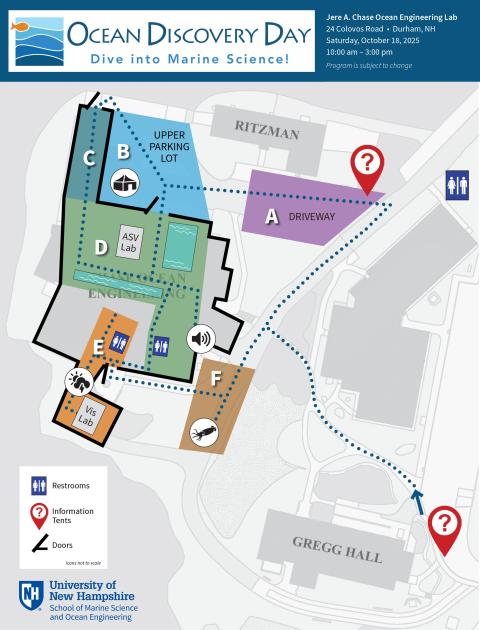
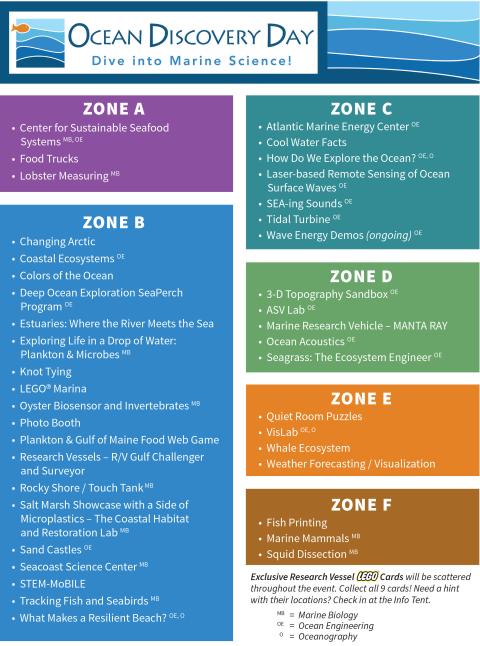
Ocean Discovery Day is a collaborative effort of the School of Marine Science and Ocean Engineering, Center for Coastal and Ocean Mapping, Center for Ocean Engineering, NH Sea Grant, UNH Marine Docents, College of Engineering and Physical Sciences and the College of Life Sciences and Agriculture.

